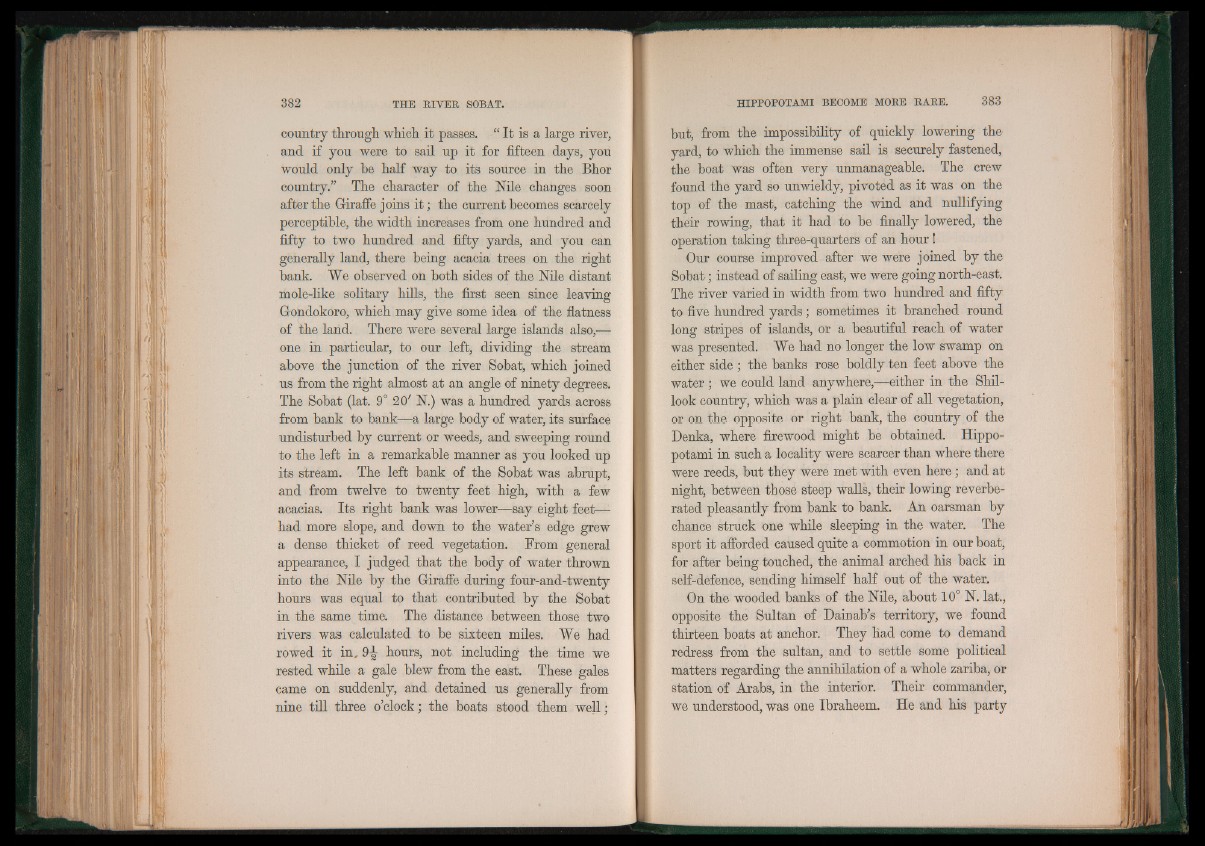
country through which it passes. “ It is a large river,
and if you were to sail up it for fifteen days, you
would only be half way to its source in the Bhor
country.” The character of the Nile changes soon
after the Giraffe joins it; the current becomes scarcely
perceptible, the width increases from one hundred and
fifty to two hundred and fifty yards, and you can
generally land, there being acacia trees on the right
bank. We observed on both sides of the Nile distant
mole-like solitary hills, the first seen since leaving
Gondokoro, which may give some idea of the flatness
of the land. There were several large islands also,—
one in particular, to our left, dividing the stream
above the junction of the river Sobat, which joined
us from the right almost at an angle of ninety degrees.
The Sobat (lat. 9° 20' N.) was a hundred yards across
from bank to bank—a large body of water, its surface
undisturbed by current or weeds, and sweeping round
to the left in a remarkable manner as you looked up
its stream. The left bank of the Sobat was abrupt,
and from twelve to twenty feet high, with a few
acacias. Its right bank was lower—say eight feet—
had more slope, and down to the water’s edge grew
a dense thicket of reed vegetation. From general
appearance, I judged that the body of water thrown
into the Nile by the Giraffe during four-and-twenty
hours was equal to that contributed by the Sobat
in the same time. The distance between those two
rivers was calculated to be sixteen miles. We had
rowed it in, 9^ hours, not including the time we
rested while a gale blew from the east. These gales
came on suddenly, and detained us generally from
nine till three o’clock; the boats stood them well;
but, from the impossibility of quickly lowering the
yard, to which the immense sail is securely fastened,
the boat was often very unmanageable. The crew
found the yard so unwieldy, pivoted as it was on the
top of the mast, catching the wind and nullifying
their rowing, that it had to be finally lowered, the
operation taking three-quarters of an hour!
Our course improved after we were joined by the
Sobat; instead of sailing east, we were going north-east.
The river varied in width from two hundred and fifty
to five hundred yards; sometimes it branched round
long stripes of islands, or a beautiful reach of water
was presented. We had no longer the low swamp on
either side ; the banks rose boldly ten feet above the
water ; we could land anywhere,—either in the Shil-
look country, which was a plain clear of all vegetation,
or on the opposite or right bank, the country of the
Denka, where firewood might be obtained. Hippopotami
in such a locality were scarcer than where there
were reeds, but they were met with even here; and at
night, between those steep walls, their lowing reverberated
pleasantly from bank to bank. An oarsman by
chance struck one while sleeping in the water. The
sport it afforded caused quite a commotion in our boat,
for after being touched, the animal arched his back in
self-defence, sending himself half out of the water,
On the wooded banks of the Nile, about 10° N. lat.,
opposite the Sultan of Dainab’s territory, we found
thirteen boats at anchor. They had come to demand
redress from the sultan, and to settle some political
matters regarding the annihilation of a whole zariba, or
station of Arabs, in the interior. Their commander,
we understood, was one Ibraheem. He and his party